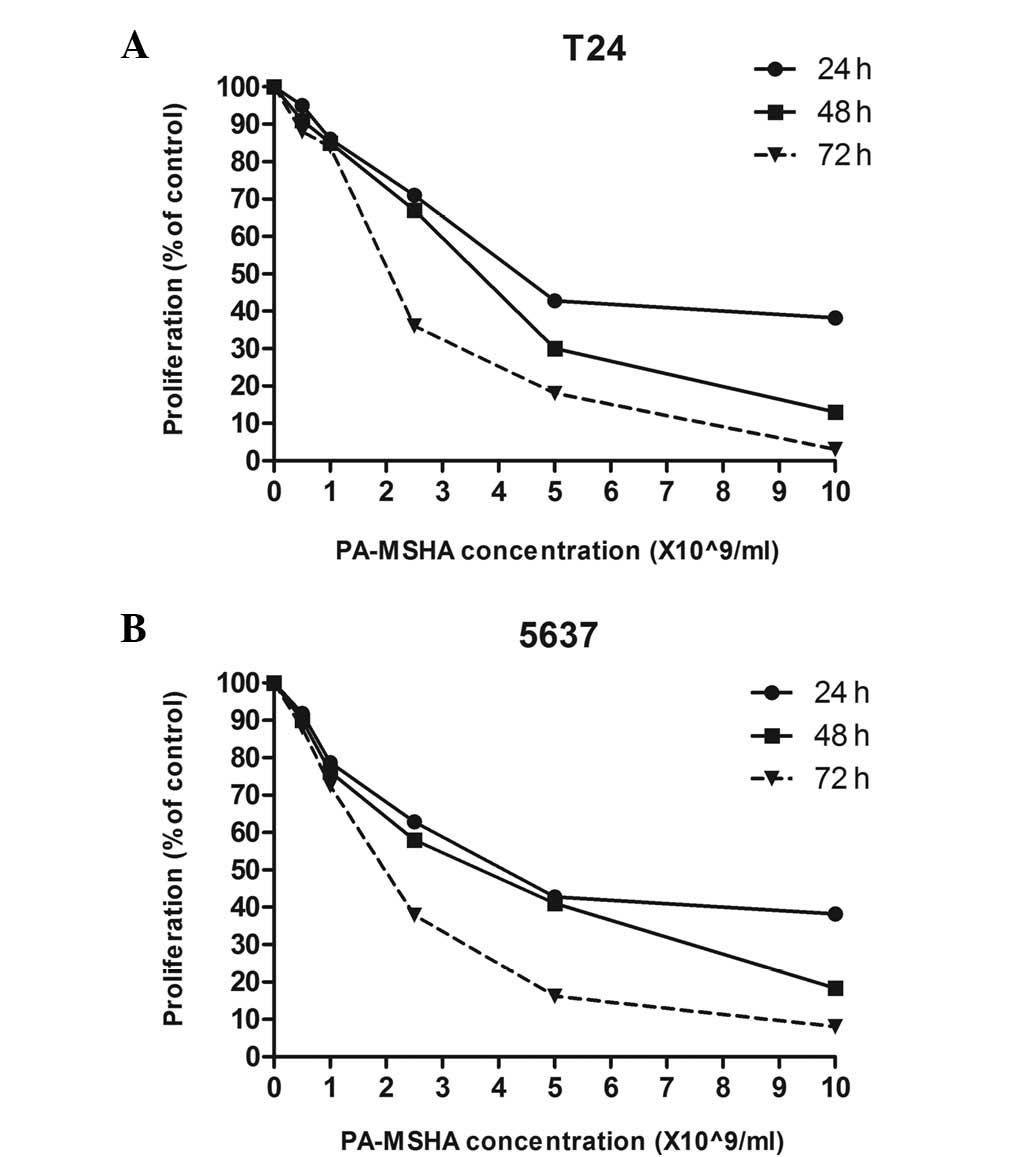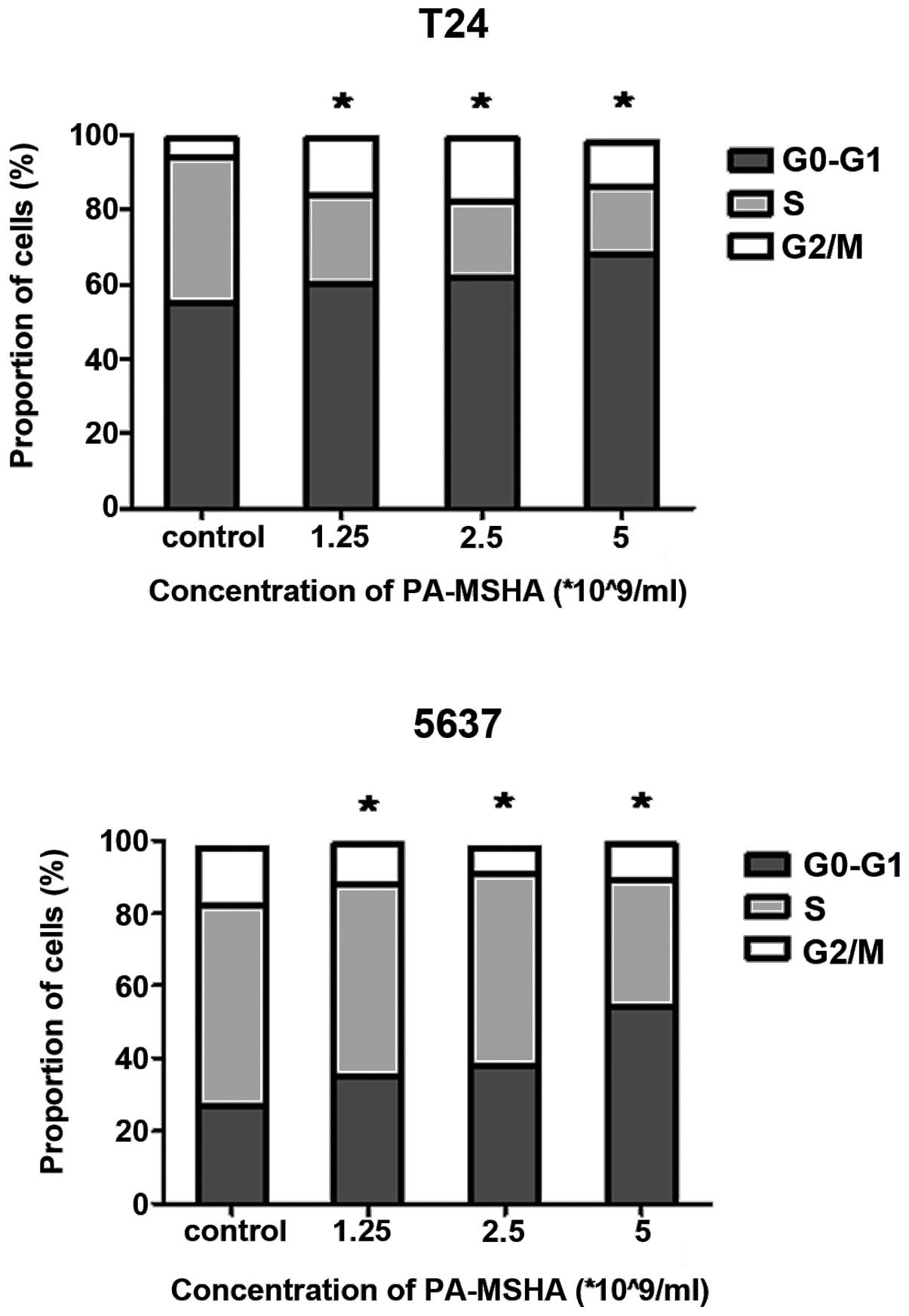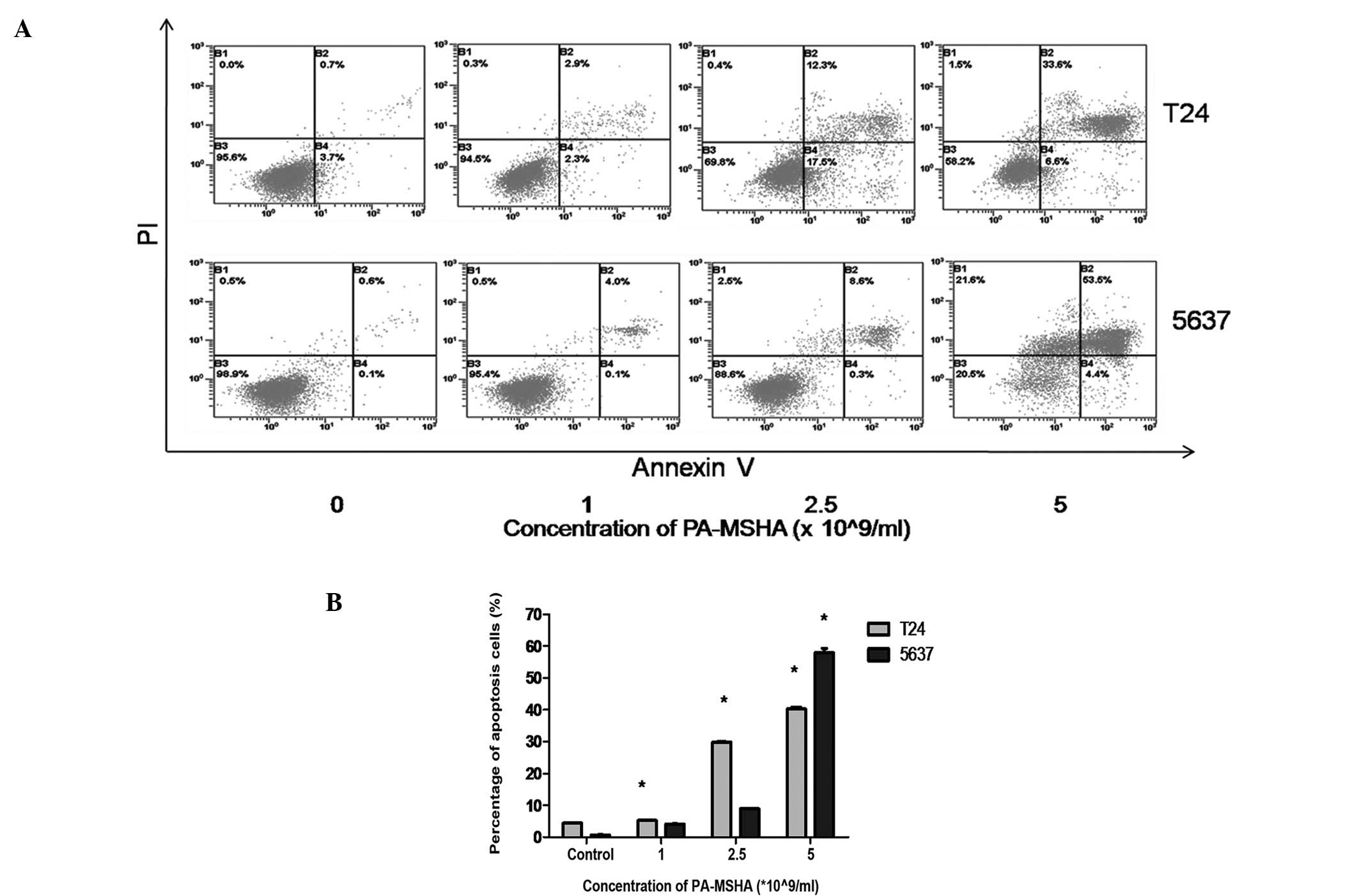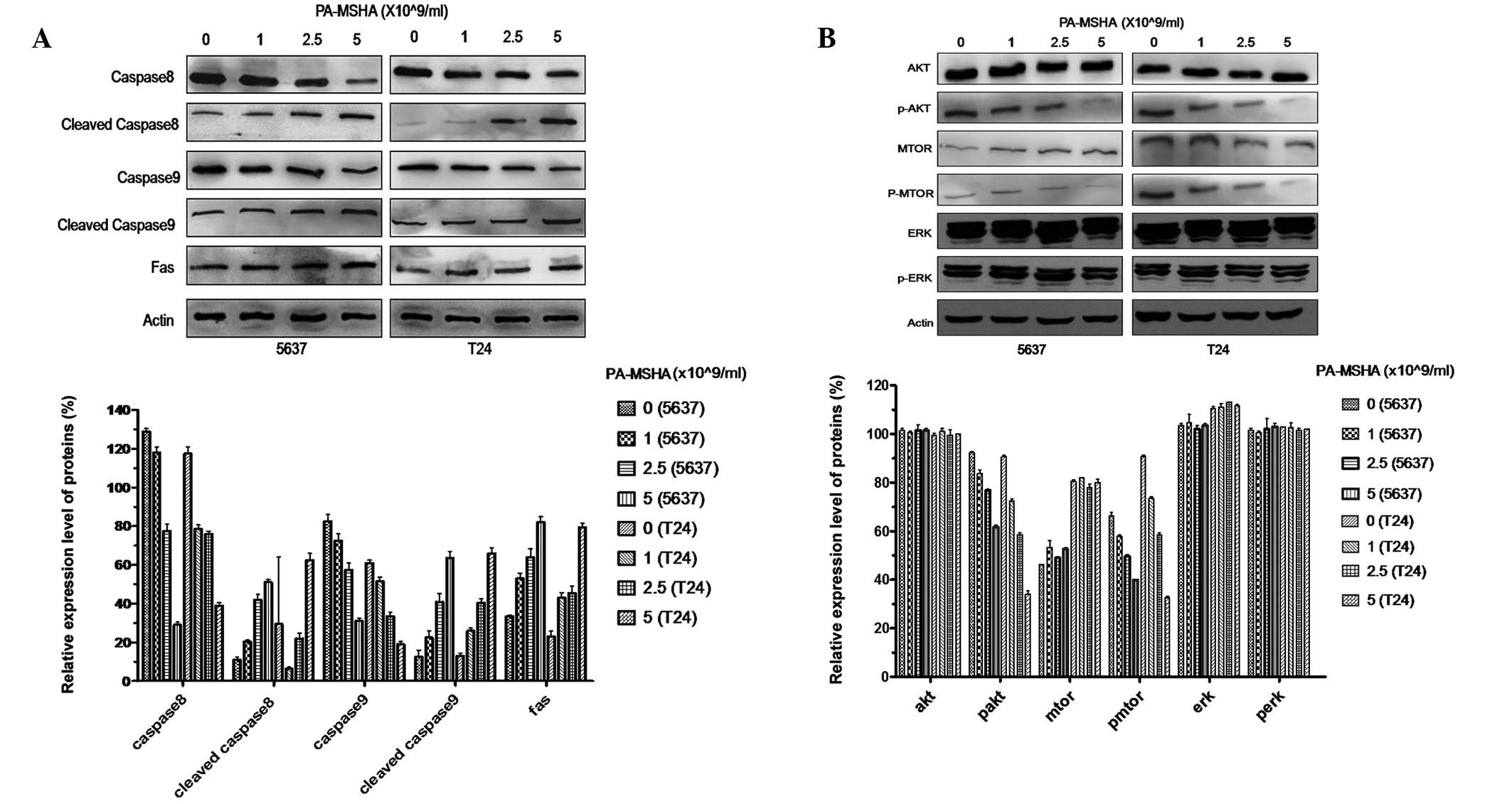|
1
|
Nargund VH, Tanabalan CK and Kabir MN:
Management of non-muscle-invasive (superficial) bladder cancer.
Semin Oncol. 39:559–572. 2012. View Article : Google Scholar : PubMed/NCBI
|
|
2
|
Mansoor M, Ali S, Fasihuddin Q and Baloch
MU: Superficial bladder tumours: recurrence and progression. J Coll
Physicians Surg Pak. 21:157–160. 2011.PubMed/NCBI
|
|
3
|
Herr HW: High-risk superficial bladder
cancer: transurethral resection alone in selected patients with T1
tumor. Semin Urol Oncol. 15:142–146. 1997.PubMed/NCBI
|
|
4
|
Mead GM, Russell M, Clark P, et al: A
randomized trial comparing methotrexate and vinblastine (MV) with
cisplatin, methotrexate and vinblastine (CMV) in advanced
transitional cell carcinoma: results and a report on prognostic
factors in a Medical Research Council study. MRC Advanced Bladder
Cancer Working Party. Br J Cancer. 78:1067–1075. 1998.
|
|
5
|
Jain RK and Forbes NS: Can engineered
bacteria help control cancer? Proc Natl Acad Sci USA.
98:14748–14750. 2001. View Article : Google Scholar : PubMed/NCBI
|
|
6
|
Kresowik TP and Griffith TS: Bacillus
Calmette-Guerin immunotherapy for urothelial carcinoma of the
bladder. Immunotherapy. 1:281–288. 2009. View Article : Google Scholar : PubMed/NCBI
|
|
7
|
Mu XY: Success in establishing the
MSHA-positive Pseudomonas aeruginosafimbrial strain. Wei
Sheng Wu Xue Bao. 26:176–179. 1986.(In Chinese).
|
|
8
|
Cao Z, Shi L, Li Y, et al: Pseudomonas
aeruginosa: mannose sensitive hemagglutinin inhibits the growth
of human hepatocarcinoma cells via mannose-mediated apoptosis. Dig
Dis Sci. 54:2118–2127. 2009. View Article : Google Scholar
|
|
9
|
Wang J, Wu D and Chen L: Pseudomonas
aeruginosavaccine inhibits the proliferation of human
nasopharyngeal cancer cells in vitro. Nan Fang Yi Ke Da Xue Xue
Bao. 32:544–547. 2012.(In Chinese).
|
|
10
|
Ling W, Liu H, Cao H, Yu FR and Xu J:
Effects of PA-MSHA vaccine on gastric cancer cells in vitro.
Zhonghua Zhong Liu Fang Zhi Za Zhi. 15:1381–1385. 2008.(In
Chinese).
|
|
11
|
Liu ZB, Hou YF, Min-Dong, et al: PA-MSHA
inhibits proliferation and induces apoptosis through the
up-regulation and activation of caspases in the human breast cancer
cell lines. J Cell Biochem. 108:195–206. 2009. View Article : Google Scholar : PubMed/NCBI
|
|
12
|
Song XX, Jiang T, Wu DJ, et al:
Intravesical instillation of PA-MSHA for preventing postoperative
recurrence of bladder cancer. Zhonghua Bi Niao Wai Ke Za Zhi.
22:597–598. 2001.(In Chinese).
|
|
13
|
Wang JS, Wang FB, Zhang QG, Shen ZZ and
Shao ZM: Enhanced expression of Rab27A gene by breast cancer cells
promoting invasiveness and the metastasis potential by secretion of
insulin-like growth factor-II. Mol Cancer Res. 6:372–382. 2008.
View Article : Google Scholar : PubMed/NCBI
|
|
14
|
Li Z, Hao D, Zhang H, Ren L, Yang Y, Li L,
Chai J, Zhou X and Fu L: A clinical study on PA-MSHA vaccine used
for adjuvant therapy of lymphoma and lung cancer. Hua Xi Yi Ke Da
Xue Xue Bao. 31:334–337. 2000.(In Chinese).
|
|
15
|
Sun WP, Fu HW, Liu N, et al: Clinical
investigation of PA-MSHA strain vaccine on the improvement of
immune functions of cancer patients. Min Guo Wei Sheng Wu Ji Mian
Yi Xue Za Zhi. 20:373–376. 2000.
|
|
16
|
Shan HW, Lin ZF, Zhao L, Yang YX and Yuan
Z: Effect of PA-MSHA vaccine on the prevention of pulmonary
infection in severe traumatic patients. Zhongguo Ji Jiu Yi Xue.
27:375–377. 2007.(In Chinese).
|
|
17
|
Cheng GZ, Jia CX and Yang HR: Studies on
mechanism of immunization against recurrent urinary tract infection
with MSHA-piliated strain vaccine of Pseudomonas aeruginosa.
Zhongguo Wei Sheng Tai Xue Za Zhi. 12:331–333. 2000.(In
Chinese).
|
|
18
|
Jia LW, Li CM, Wang YD, Hou JP and Mu XY:
Protective effect of PA-MSHA vaccine on experimental hepatic
fibrosis. Basic Med Sci Clin. 1:73–78. 1999.(In Chinese).
|
|
19
|
Jia L, Wang C, Kong H, et al: Effect of
PA-MSHA vaccine on plasma phospholipids metabolic profiling and the
ratio of Th2/Th1 cells within immune organ of mouse IgA
nephropathy. J Pharm Biomed Anal. 43:646–654. 2007. View Article : Google Scholar : PubMed/NCBI
|
|
20
|
Muzio M, Stockwell BR, Stennicke HR,
Salvesen GS and Dixit VM: An induced proximity model for caspase-8
activation. J Biol Chem. 273:2926–2930. 1998. View Article : Google Scholar : PubMed/NCBI
|
|
21
|
Liu X, Kim CN, Yang J, Jemmerson R and
Wang X: Induction of apoptotic program in cell-free extracts:
requirement for dATP and cytochrome c. Cell. 86:147–157. 1996.
View Article : Google Scholar : PubMed/NCBI
|
|
22
|
Cannon CL, Kowalski MP, Stopak KS and Pier
GB: Pseudomonas aeruginosa-induced apoptosis is defective in
respiratory epithelial cells expressing mutant cystic fibrosis
transmembrane conductance regulator. Am J Respir Cell Mol Biol.
29:188–197. 2003. View Article : Google Scholar
|
|
23
|
Jendrossek V, Grassmé H, Mueller I, Lang F
and Gulbins E: Pseudomonas aeruginosa-induced apoptosis
involves mitochondria and stress-activated protein kinases. Infect
Immun. 69:2675–2683. 2001. View Article : Google Scholar
|
|
24
|
Chen M, Cassidy A, Gu J, et al: Genetic
variations in PI3K-AKT-mTOR pathway and bladder cancer risk.
Carcinogenesis. 30:2047–2052. 2009. View Article : Google Scholar : PubMed/NCBI
|
|
25
|
Sun CH, Chang YH and Pan CC: Activation of
the PI3K/Akt/mTOR pathway correlates with tumour progression and
reduced survival in patients with urothelial carcinoma of the
urinary bladder. Histopathology. 58:1054–1063. 2011. View Article : Google Scholar : PubMed/NCBI
|
|
26
|
Yohn NL, Bingaman CN, DuMont AL and Yoo
LI: Phosphatidylinositol 3′-kinase, mTOR, and glycogen synthase
kinase-3β mediated regulation of p21 in human urothelial carcinoma
cells. BMC Urol. 11:192011.
|
|
27
|
Liu ZB, Hou YF, Zhu J, et al: Inhibition
of EGFR pathway signaling and the metastatic potential of breast
cancer cells by PA-MSHA mediated by type 1 fimbriae via a
mannose-dependent manner. Oncogene. 29:2996–3009. 2010. View Article : Google Scholar : PubMed/NCBI
|
|
28
|
Zhang S, Zhang Y, Zhuang Y, et al: Matrine
induces apoptosis in human acute myeloid leukemia cells via the
mitochondrial pathway and Akt inactivation. PLoS One. 7:e468532012.
View Article : Google Scholar : PubMed/NCBI
|
|
29
|
Yuan L, Wang J, Xiao H, Xiao C, Wang Y and
Liu X: Isoorientin induces apoptosis through mitochondrial
dysfunction and inhibition of PI3K/Akt signaling pathway in HepG2
cancer cells. Toxicol Appl Pharmacol. 265:83–92. 2012. View Article : Google Scholar : PubMed/NCBI
|
|
30
|
Gong C, Liao H, Wang J, et al: LY294002
induces G0/G1 cell cycle arrest and apoptosis of cancer stem-like
cells from human osteosarcoma via down-regulation of PI3K activity.
Asian Pac J Cancer Prev. 13:3103–3107. 2012. View Article : Google Scholar : PubMed/NCBI
|


















